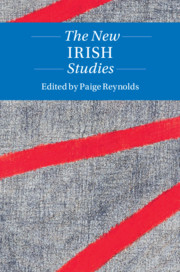Book contents
- The New Irish Studies
- Twenty-First-Century Critical Revisions
- The New Irish Studies
- Copyright page
- Contents
- Notes on Contributors
- Acknowledgments
- Introduction
- Part One Legacies
- Chapter 1 People: Race and Class on the Contemporary Irish Stage
- Chapter 2 Nation: Reconciliation and the Politics of Friendship in Post-Troubles Literature
- Chapter 3 Migration: Migrant Artists Changing the Rules in Post-Celtic Tiger Ireland
- Chapter 4 Language: “World Literature” and Contemporary Irish-Language Writing
- Chapter 5 Land: Neoliberal Wastelands in Contemporary Postapocalyptic Irish Cinema
- Part Two Contemporary Conditions
- Part Three Forms and Practices
- Index
Chapter 4 - Language: “World Literature” and Contemporary Irish-Language Writing
from Part One - Legacies
Published online by Cambridge University Press: 18 September 2020
- The New Irish Studies
- Twenty-First-Century Critical Revisions
- The New Irish Studies
- Copyright page
- Contents
- Notes on Contributors
- Acknowledgments
- Introduction
- Part One Legacies
- Chapter 1 People: Race and Class on the Contemporary Irish Stage
- Chapter 2 Nation: Reconciliation and the Politics of Friendship in Post-Troubles Literature
- Chapter 3 Migration: Migrant Artists Changing the Rules in Post-Celtic Tiger Ireland
- Chapter 4 Language: “World Literature” and Contemporary Irish-Language Writing
- Chapter 5 Land: Neoliberal Wastelands in Contemporary Postapocalyptic Irish Cinema
- Part Two Contemporary Conditions
- Part Three Forms and Practices
- Index
Summary
This chapter argues that contemporary Irish-language writing demands a critical response that recognizes its increasingly transnational or global thematic range. The endangered status of the language, far from demoralizing writers, seems to provide them motivation to transcend limiting sociolinguistic realities. The minority subject position becomes a lens for engagement with global issues, as witnessed in a large and diverse body of poetry related to contemporary wars and international conflicts and in a body of fictional writing that engages with transnational history and cultural critique. Contemporary Irish-language writers collectively display an acute awareness of Irish participation or collusion in oppressive imperial or colonial projects. A selection of examples is cited to demonstrate how the resources of the Irish linguistic and literary tradition have been brought to bear on contemporary and historical events and predicaments. In giving voice to global concerns, the Irish language ironically becomes a potent medium with which to question the primacy of national ethnic identification.
- Type
- Chapter
- Information
- The New Irish Studies , pp. 80 - 94Publisher: Cambridge University PressPrint publication year: 2020



